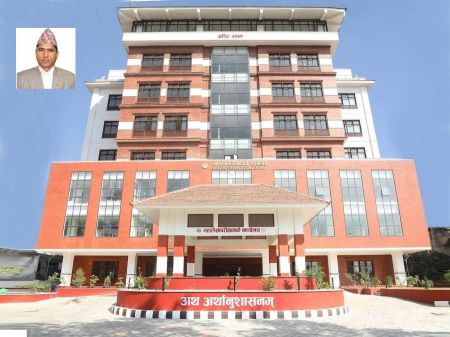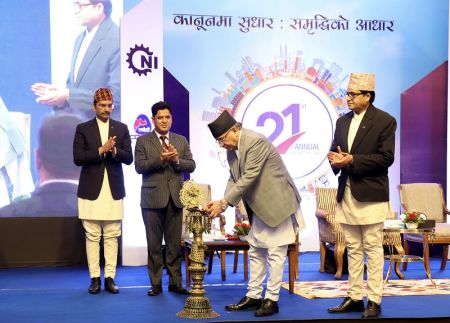--By Suraksha Adhikari
Nepali footwear products have been dominating the domestic market in the recent years. While the consumers have shown interest in using international brand designer shoes, their interest is growing also in made-in-Nepal. Manufacturers claim that locally made shoes account for more than 50 percent of the sales.
A corresponding growth has been seen in footwear factories too. There are presently around 10 medium-scale footwear factories across the country. Nepali customers are gradually getting attracted towards shoes produced in Nepal for design, and durability of the shoes.
“There has been a healthy growth in the number of buyers for locally manufactured footwear,” Ram Krishna Prashain, said Managing Director of Shikhar Shoes, one of the prominent names in the domestic footwear market,. “This has been possible due to adaptation of advanced manufacturing technologies, delivery of quality products and keeping up with the expectation of customers,” he added.
Present Status of the Market
According to Prashain, the domestic market is witnessing a change in the buying pattern of customers. “Slowly and steadily, we are seeing more and more people who used to prefer branded products from foreign countries coming to us. And once they use our products, they become regular customers,” said Prashain. He added that the company is planning to roll out a new premium brand targeting high-end customers in the near future. “Currently, we are carrying out a feasibility study. If we get positive results, we will install a new plant,” he said. Products from Shikhar Shoes are priced between Rs 350 andRs 4,000.
Base Footwear, manufacturer of ‘BF dear hill’ brand of footwear and another prominent player in the domestic market, has also been witnessing enormous success. “Almost all the multi-branded footwear stores across the country now feature products from at least one of the domestic brands,” said Hom Nath Upadhyay, Managing Director of Base Footwear. He added that the company’s annual production comes to 150,000-200,000 pairs. Its products are priced in the range of Rs 450 - Rs 3,500. Base Footwear products range from school and college shoes to party shoes, casual shoes and sports shoes. The company has recently started manufacturing football boots also.
When asked about the raw material, Upadhyay informs that polyvinyl chloride, and thermoylae rubbers around 80 per cent of Nepal’s leather requirement is fulfilled by imports from Thailand, China and India, while 20 per cent is produced in Nepal itself. The other major raw material such as polyurifine, polyvinyl chloride, and thermopoly rubbers too are imported. Upadhyay said that domestic products presently occupy 55 per cent of the Nepali leather goods and footwear market. He is optimistic that the domestic brands will occupy more share of the market in the days ahead as demand for these products continues to surge due to comparatively affordable prices than imported products while the quality of the domestic products is comparable with the imported ones. In fact, while the leather used in the Nepal-made shoes is genuine, the imported shoes may be using imitate on leather which is difficult for the ordinary people to identify. He said, “In terms of price, our competition is with those imports that use fake international brand names.”
People usually buy the Chinese-made “international brands” which are not as good as the authentic brands. They bear the logos of popular international brands, but they are counterfeit products. Claiming that the domestic footwear manufacturers are offering better affordability, better quality and better designs than the Chinese imitations, Upadhyay encourages consumers to buy domestic products instead of running behind so called branded and designers’ products. He said, “People have to understand that they can have Nepali genuine products for the same price that they pay for those fake products.”
The domestic footwear makers has started manufacturing sports and casual shoes as well while till recently they were producing mainly for school children. Manufacturers say that increasing buyer confidence had inspired them to try their hand at new products. “We are now planning to expand the product line-up in the casual and sports series,” said Prashain. “We are about to install a new plant to manufacture ladies footwear. We are in the final stages of our preparation to produce rubber boots.”
Imported Raw Materials
Eighty percent of the raw material is imported. And 40 per cent of it comes from China, 30 per cent from India and the remaining from other nations. At present, Nepal produces only 20 per cent of the raw material the industry needs.
According to a survey conducted by Leather Footwear and Goods Manufacturers’ Association Nepal (LFGMAN) an average single Nepali spends Rs 2500 annually on shoes. Hom Nath Upadhyay, also the President of LFGMAN said, “That means, when you think about the entire population, the annual spending of Nepali population on shoes is huge. If Nepali products are promoted, we can prevent that money from going outside the country.”
“We are looking forward to be self-dependent in leather goods and footwear. If we can achieve that, it will be very helpful to the economy. Besides, this will create more employment opportunities in Nepal itself,” he added.
(2).jpg)
Problems & Challenges
Despite having deeper penetration in the domestic footwear market, Nepali shoe manufacturers claim that they could do even better if their concerns are addressed properly. Unfair customs duty on raw materials and unavailability of skilled manpower are their major concerns, which if addressed by the government, they say, could enable them to outshine foreign products in the domestic market.
Upadhyay said that shortage of skilled and efficient manpower has been the major problem in this sector.
“Energy crisis is another challenge for us. We don’t have local industries that produce raw material for our industry. Even in case of imported raw material, we do not have sufficient supply,” he said. Moreover, some of these raw material are heavily taxed making the final products expensive.
Elaborating further on their concerns, he said undeterred huge import of Chinese counterfeit products is another major problem. “If such import is discouraged, Nepali brands will have a better market,” he said.
Sharing his experience of retaining the market, he said “We have to look for new designs and trends continuously. Shoes go out of fashion very soon and we have to tap trending designs to retain our customers. This includes updating our manufacturing technology and marketing patterns. We just have to be moving, and we cannot rest. This makes it a tough job,” he said.
Stressing on the role of government for the promotion of the footwear market in Nepal, Upadhyay said, “The government should give more priority to this sector and create favourable environment for it. This sector makes use of Nepali skill and labour. There is no foreign investment here, so we can say we are a true Nepali business sector.
“People should show their love to domestic products by giving them a try. We need more support and feedback from our customers to serve them better products in the days to come.”






















